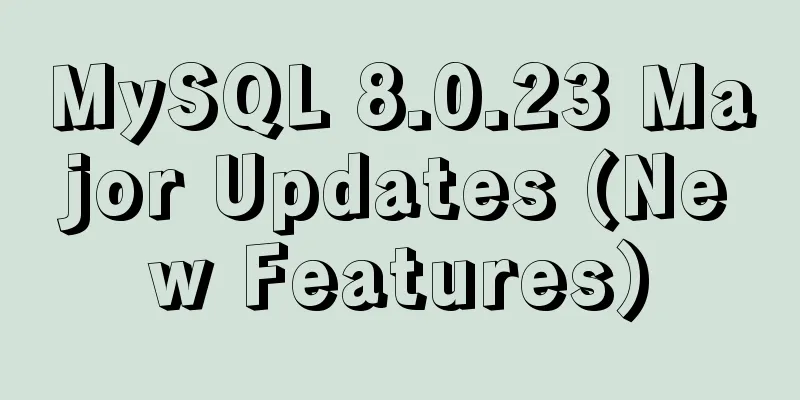MySQL 8.0.23 Major Updates (New Features)

|
Author: Guan Changlong is a DBA in the Delivery Services Department of Aikesheng. He is mainly responsible for the daily problem handling of MySQL and Redis, and participates in the teaching and research of the company's database training and the operation of the open source community. The previous article introduced a super detailed tutorial on how to install MySQL 8.0.23. If you are interested, click to view it. MySQL 8.0.23 was released today. The release frequency is now stable at once every three months. This release is a maintenance version. In addition to fixing some bugs, this version also adds some new features. 1. Invisible columnsColumns can be defined as invisible, for example: # When creating a table, you can make it invisible (ALTER TABLE also supports this) mysql> CREATE TABLE t1 (col1 INT, col2 INT INVISIBLE); mysql> INSERT INTO t1 (col1, col2) VALUES (1, 2), (3, 4); # SQL statement uses the invisible column by explicitly referencing it mysql> SELECT * FROM t1; +------+ | col1 | +------+ | 1 | | 3 | +------+ # If an invisible column is not referenced, it will not appear in the result mysql> SELECT col1, col2 FROM t1; +------+------+ | col1 | col2 | +------+------+ | 1 | 2 | | 3 | 4 | +------+------+ https://dev.mysql.com/doc/refman/8.0/en/invisible-columns.html 2. Query attributesAllows an application to set per-query metadata for its queries.
mysql> query_attributes n1 v1 n2 v2;
mysql> SELECT
mysql_query_attribute_string('n1') AS 'attr 1',
mysql_query_attribute_string('n2') AS 'attr 2',
mysql_query_attribute_string('n3') AS 'attr 3';
+--------+--------+--------+
| attr 1 | attr 2 | attr 3 |
+--------+--------+--------+
| v1 | v2 | NULL |
+--------+--------+--------+https://dev.mysql.com/doc/refman/8.0/en/query-attribute-udfs.html#udf_mysql-query-attribute-string 3. SafetyDoublewrite file page encryption InnoDB automatically encrypts Doublewrite file pages that belong to encrypted tablespaces; no action is required. Doublewrite file pages are encrypted using the encryption key of the associated tablespace. The encrypted pages where data is written in the same tablespace are also written to the Doublewrite file. Doublewrite file pages belonging to unencrypted tablespaces remain unencrypted. During recovery, encrypted Doublewrite file pages are unencrypted and checked for corruption. https://dev.mysql.com/doc/refman/8.0/en/innodb-data-encryption.html Improve account certainty To make TCP connection matching accounts more deterministic, the host name portion of the matching account is checked in the following order before matching the account specified by the host name: Using the host IP address to specify the account. # Specify the account with the IP addressmysql> CREATE USER 'user_name'@'127.0.0.1'; mysql> CREATE USER 'user_name'@'198.51.100.44'; # Account specified as an IP address using CIDR notationmysql> CREATE USER 'user_name'@'192.0.2.21/8'; mysql> CREATE USER 'user_name'@'198.51.100.44/16'; # Use an account specified as an IP address in subnet mask format mysql> CREATE USER 'user_name'@'192.0.2.0/255.255.255.0'; mysql> CREATE USER 'user_name'@'198.51.0.0/255.255.0.0'; https://dev.mysql.com/doc/refman/8.0/en/connection-access.html More precise FLUSH permissions A user granted the RELOAD privilege can perform various operations. To enable DBAs to avoid granting RELOAD in some cases and to keep user privileges closer to permitted operations, finer-grained privilege control over FLUSH operations has been introduced so that customers can execute FLUSH OPTIMIZER_COSTS, FLUSH STATUS, FLUSH USER_RESOURCES, and FLUSH TABLES statements without the RELOAD privilege. https://dev.mysql.com/doc/refman/8.0/en/privileges-provided.html#priv_reload 4. InnoDBOptimizing TRUNCATE / DROP When a user performs a TRUNCATE or DROP operation on an InnoDB tablespace:
In the above case, MySQL now marks it as deleted and then lazily releases all pages belonging to the deleted tablespace from the buffer pool or reuses them as it frees the pages. Added tablespace AUTOEXTEND_SIZE attribute The InnoDB regular table CREATE / ALTER TABLESPACE clause and the independent tablespace CREATE / ALTER TABLE clause have a new auto-extend attribute. The original tablespace growth size is hard-coded in InnoDB internally to 1MB [default] (page_size * number of pages in a range). Once set, the tablespace can grow to a size that is determined by the user.
# Specify the extension space size when creating or modifying a table mysql> CREATE TABLE t1 (c1 INT) AUTOEXTEND_SIZE = 4M;
mysql> ALTER TABLE t1 AUTOEXTEND_SIZE = 4M;
# Query the attribute valuemysql> SELECT NAME, AUTOEXTEND_SIZE FROM INFORMATION_SCHEMA.INNODB_TABLESPACES
WHERE NAME LIKE 'test/t1';
+---------+-----------------+
| NAME | AUTOEXTEND_SIZE |
+---------+-----------------+
| test/t1 | 4194304 |
+---------+-----------------+https://dev.mysql.com/doc/refman/8.0/en/innodb-tablespace-autoextend-size.html Added temptable_max_mmap variable The new variable defines the maximum amount of memory that the TempTable storage engine is allowed to allocate from memory-mapped files before it starts storing internal temporary table data to InnoDB disk internal temporary tables. The temptable_max_mmap = 0 setting disables allocations from memory mapped files. https://dev.mysql.com/doc/refman/8.0/en/server-system-variables.html#sysvar_temptable_max_mmap 5. CopyTerm substitution The CHANGE MASTER TO statement is deprecated. Use the alias CHANGE REPLICATION SOURCE TO instead. The parameters of the statement also have aliases that replace the term MASTER with the term SOURCE. For example, MASTER_HOST and MASTER_PORT can now be entered as SOURCE_HOST and SOURCE_PORT. The parameters MASTER_LOG_POS and MASTER_LOG_FILE of the START REPLICA | SLAVE statement now have aliases SOURCE_LOG_POS and SOURCE_LOG_FILE. The statements work the same way as before, only the terminology used for each statement has changed. If an older version is used, a deprecation warning will be issued. Replicate directly from a GTID-disabled master to a GTID-enabled slave New option for CHANGE REPLICATION SOURCE TO statement: ASSIGN_GTIDS_TO_ANONYMOUS_TRANSACTIONS = [OFF,LOCAL,<UUID>] Allows data to be transferred between non-GTID instances and GTID instances. https://dev.mysql.com/doc/refman/8.0/en/replication-gtids-assign-anon.html Including MDL and ACL locks in the MTS deadlock detection infrastructure Integrates the thread serialization infrastructure required to provide multithreaded REPLICA that maintains the same commit order as SOURCE with the MDL and ACL access serialization infrastructure. The motivation is to be able to execute any client statement on REPLICA while REPLICA is actively processing the change stream. Such statements can create deadlocks, which must be detected and eventually broken to continue execution. Group Replication Automatic connection failover for asynchronous replication channels will ensure that the sender list on the receiver side is synchronized with Group Replication membership changes. 6. X ProtocolClassic MySQL protocol, if the SQL query uses metadata locking or sleep functions, the connection to the server will be checked periodically to verify that it is still valid. If not, the query can be stopped so that it does not continue to consume resources. Previously, the X protocol did not perform these checks and assumed that the connection was still valid. Checks have now been added for the X protocol. Starting with MySQL 8.0.23, the server notifies all clients about whether it has just closed the connection or closed it on its own. The client can use this information to decide whether it makes sense to reconnect and try again. VII. OthersOptimize hash table implementation for hash joins. The goal is to increase performance, use less memory and improve memory control. Replaced some old InnoDB code with standard C++11. Enforce the rules and semantics of using atomicity in your code, thus making it more standards-compliant. 8. Deprecation and RemovalDeprecated relay_log_info_repository and master_info_repository. A deprecation warning will appear when a user sets or reads the value of the relay_log_info_repository or master_info_repository variables. Going forward, the only option for storing replication configuration and metadata will be in transactional system tables. The FLUSH HOSTS statement is deprecated in favor of TRUNCATE performance_schema.host_cache and will be removed in a future MySQL version. Article reference
This is the end of this article about the major updates of MySQL 8.0.23 (interpretation of new features). For more relevant MySQL 8.0.23 updates, please search for previous articles on 123WORDPRESS.COM or continue to browse the related articles below. I hope everyone will support 123WORDPRESS.COM in the future! You may also be interested in:
|
<<: Example of making a butterfly flapping its wings with pure CSS3
>>: Detailed explanation of Javascript basics
Recommend
Exploration and correction of the weird behavior of parseInt() in js
Background: I wonder if you have noticed that if ...
A detailed analysis and processing of MySQL alarms
Recently, a service has an alarm, which has made ...
Three Ways to Find the Longest Word in a String in JavaScript (Recommended)
This article is based on the Free Code Camp Basic...
Mysql Chinese sorting rules description
When using MySQL, we often sort and query a field...
Ubuntu MySQL version upgraded to 5.7
A few days ago, the library said that the server ...
Reasons why MySQL kill cannot kill threads
Table of contents background Problem Description ...
Explanation of installation and configuration of building go environment under linux
It is very simple to build a go environment under...
Detailed explanation of setting resource cache in nginx
I have always wanted to learn about caching. Afte...
VMware Workstation Pro 16 License Key with Usage Tutorial
VMware Workstation is a powerful desktop virtual ...
MySQL 8.0.16 installation and configuration tutorial under Windows 10
This article shares with you the graphic tutorial...
Solution to the problem of too high penetration of input and textarea levels in WeChat applet
The WeChat mini-program native components camera,...
How to deploy nextcloud network disk using docker
NextCloud You can share any files or folders on y...
Explore the characteristics and expressions of different spaces in HTML (recommended)
I. Overview When writing HTML templates, spaces a...
Implementation of MySQL scheduled backup script under Windows
On a Windows server, if you want to back up datab...
Summary of Binlog usage of MySQL database (must read)
I won't go into details about how important b...









